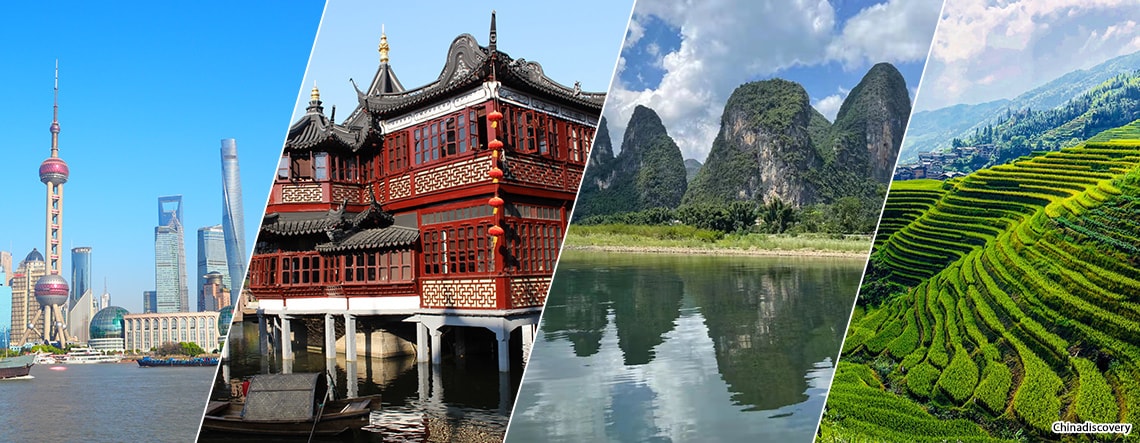20 Free Ways For Deciding On China Tour Sites
Wiki Article
Top 10 Tips For The Proper Manner To Bargain In China
1. Start low, but be RespectfulTip Offer 50-70 percent less than the quoted price and negotiate upwards. To prove that you're serious, be firm but polite.
Pro: Helps establish your position, without causing offence to the seller.
Cons The idea of starting too low can make sellers unhappy with items that have lower margins.
2. Be aware of the market value
Tip: Research the average price of the item in advance to ensure you don't overpay.
Pro: Increases your security and helps prevent scams.
Con: It can take time to conduct research, especially for handmade or unique products.
3. Show Genuine Interest
Tips - Sellers are willing to negotiate more if you show an interest in buying.
Pro: Creates a rapport with the client and improves their chances of obtaining the best price.
Arousal: Excessive enthusiasm can signal a willingness to pay more, thereby weakening your case.
4. Take a step back strategically
Walking slowly away if you can't bring the price down is a smart idea. Sellers may call for a better price.
Pro: A very effective strategy which can result in the lowest price.
Cons: This could cause problems if the seller does not intend to cut costs, especially for products which are highly sought-after.
5. Learn Basic Mandarin Phrases
Tip: Phrases like "Tai gui le!" (Too expensive!) "Pianyi Yadian Ba" (Can it be cheaper?) It is necessary to exert effort.
Pro: Personalizes the negotiations and softens the seller’s stance.
Con: Using specific phrases in more complex negotiation may not help.
6. Be patient and remain calm
Tips: Negotiations may take time. Be calm and not appear in a state of panic.
Pro: Sellers appreciate the calm and persevering buyers, often rewarding them with better deals.
Con: Requires time and energy, particularly in busy markets.
7. Bring Cash
Cash payment is more likely to be accepted by merchants than digital payment.
Pro: Immediate cash offers can result in discounts, particularly with smaller vendors.
Con: Carrying cash in crowded places can be dangerous due to pickpockets.
8. Discounts for Groups
Tips: If you are buying several items, you may request a discount price.
Pro: Increases the bargaining skills and allows you get better bargains.
Cons: You might have to purchase additional items which don't always meet your needs.
9. Do not be afraid to say no
TIP: Never decline a price, and then walk away if you find that the seller will not reduce the price.
Pro: This will help reduce buyer's regret. It also ensures that you are within your budget.
Cons: You might miss out on an item you really would have.
10. How to avoid bargaining
Don't bargain at department stores or expensive boutiques.
Pro: Maintains cultural sensitivity and avoids embarrassment.
Cons: Your chances of negotiating are less likely in certain situations.
Bargaining in China has its benefits
Negotiating costs can be an excellent way to reduce costs.
Cultural Experience: Bargaining enables you to get a better understanding of the local customs and culture.
Personal Interactions: This creates an intimate relationship with the local vendors.
Pros and Cons of Bargaining in China
Time-consuming: Haggling can be long, especially for shoppers who aren't experienced.
Language barriers can lead to communication difficulties.
The process of bargaining can be stressful for certain people.
By mastering these tips, you'll master the art of navigating Chinese markets with confidence and will enjoy the art of haggling as a part of your cultural journey! Take a look at the recommended get insights on this tourist spot for website recommendations including shopping in xi an, chaotianmen dock%EF%BC%8C a major water transportation hub in chongqing, temple of confucius one of the three largest ancient architectural complexes, shopping in nanjing, tours for the disabled, south luogu laneone of the oldest neighborhoods in beijing, guanlin temple, shaoxing wine the best yellow wine in china, eating in taiyuan, eating in zhengzhou and more.

Top 10 Tips For Fees And Photographic Rules For Visiting Chinese Temples
1. You can budget your expenses by researching ticket prices in advance. To plan your budget, research ticket prices before you leave.
Pro You'll be able to prepare the correct amount in cash or electronic payment and be able to avoid unpleasant surprise.
Con Extra costs, for example special exhibition fees may be unanticipated.
2. Bring Cash Or Digital Payment
You can only pay cash at temples or with popular Chinese payment methods like WeChat Pay and Alipay.
Pro: Ensures smooth entry with no delays in payments.
Cons: Limited choices for travelers unfamiliar with digital payments.
3. Watch for signs that mention photography
Look for signs that tell you whether or not photography is permitted. A lot of temples prohibit photography within the sanctuaries of sacred artifacts or inside temples.
Pro: It deters accidental infractions or violations of rules.
Con: Rules may vary between areas within the same temple, requiring extra attention.
4. Avoid Flash Photography
If photography is allowed in a specific zone, it is best to stay clear of flash. It can cause damage to artwork, or cause disturbance to worshipers.
Pro: Preserves temple's art and environment.
Poor lighting can lead to poor photographs.
5. Respect, Worshippers Privacy
A tip: Do not capture people in religious ceremonies or praying unless the person has given their consent.
Pro: Shows cultural sensitivity and respect for the privacy of one's own.
Cons Limits your ability to capture the temple's atmosphere.
6. Drone restrictions will be in place
A tip - Drones usually are prohibited in temples. Be sure to check local regulations if you plan to use one to take aerial photos.
Pros: It's safe from fines and the confiscation of your drone.
Cons: It limits the possibility of capturing unique angles.
7. Be prepared for additional fees
A tip: Some temples charge an extra fee for the use of professional equipment, such as DSLRs or Tripods.
Pro: This assures that the images are taken in high-quality and legally.
Cons: It increases overall trip costs
8. Dress in a modest manner
It is crucial to dress appropriately for temples. Unrespect for the temples' decorum could result in you being denied entry, or even having certain areas closed.
Pro: It shows you respect the religious setting and helps you blend in.
Con: May need extra preparation, particularly during hot weather.
9. Beware of crowds when taking photos
TIP: Visit early in the morning, or late in the afternoon, to avoid crowds, which makes it easier to take unobstructed photographs.
Enhances the quality of your photographs and experiences.
Cons: This might require you to alter your schedule. It is not always feasible.
10. Request Permission If Uncertain
Tips: If you are unsure regarding photography regulations, consult temple staff or signposts for clarification.
Pro: It helps you avoid breaking the rules.
Con: Language barriers might make communication difficult.
Pros of Keeping Fees and Photography Rules
Respect for Cultural Values: Be respectful of the local customs, religions and other aspects of culture.
Artifact Protection: Protect fragile artwork and structures against damage.
Positive Experiences: Avoid confrontations with temple staff or worshippers.
Legal Compliance: Helps to avoid penalties for infringements of photography laws.
Cons of Keeping Fees in Mind and the Photography Rules
Costs are increased: Additional charges such as entry fees and photography permits could add to the total.
Restrictions on Creativity can prevent an ideal picture.
Language Barriers: Inability to comprehend local signs or communicate with staff.
Time-Consuming Research: Preparing ahead requires more effort and time.
By adhering to the photography and fees rules, you can be sure of a a respectful, lawful, and enjoyable visit to China's magnificent temples as well as preserving their cultural and spiritual integrity. See the recommended visit this breathtaking landmark for more examples including mount li a royal garden since the zhou dynasty, tips for identifying copyright, hua diao the most famous shaoxing yellow wine, popular beijing night markets, shenzhen golf club, south luogu laneone of the oldest neighborhoods in beijing, shopping in fuzhou, shopping in dunhuang, splendid china tour.html, eating in fuzhou and more.
